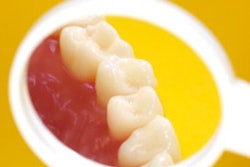Scientists at the University of Michigan claim that gene therapy can be used to successfully stop the development of periodontal disease, according to a university press release.
Using gene transfer to treat life-threatening conditions is not new, but the University of Michigan group is the first known to use the gene delivery approach to show potential in treating chronic conditions such as periodontal disease, said William Giannobile, D.D.S., D.Med.Sc., a professor at the School of Dentistry and principal investigator on the study.
Using gene therapy, Dr. Giannobile's group found a way to help certain cells using an inactivated virus to produce more of a naturally produced molecule soluble TNF receptor. This factor is underproduced in patients with periodontitis. The molecule delivered by gene therapy works like a sponge to sop up excessive levels of tumor necrosis factor, a molecule known to worsen inflammatory bone destruction in patients afflicted with rheumatoid arthritis, joint deterioration, and periodontitis.
Their findings have been published online in advance of print publication in Gene Therapy.
"If you deliver the gene into the target cells once, it keeps producing in the cells for a very long period of time or potentially for the life of the patient," Dr. Giannobile stated in the press release. "This therapy is basically a single administration, but it could have potentially lifelong treatment effects in patients who are at risk for severe disease activity."
The next step is additional safety testing on periodontal patients, he added.



















